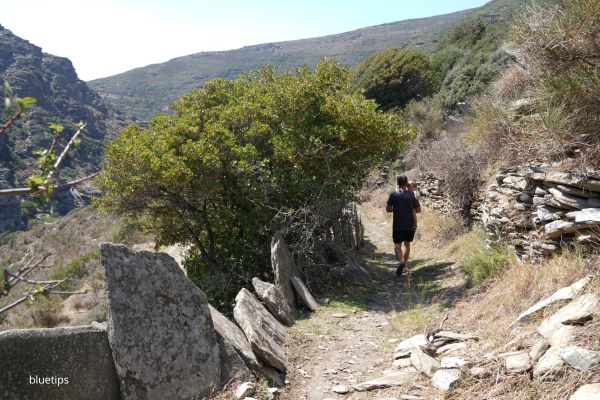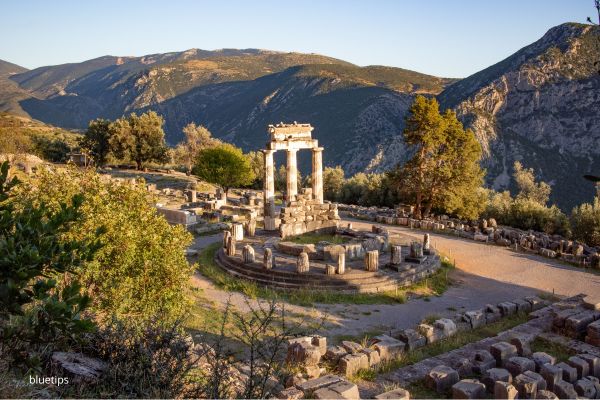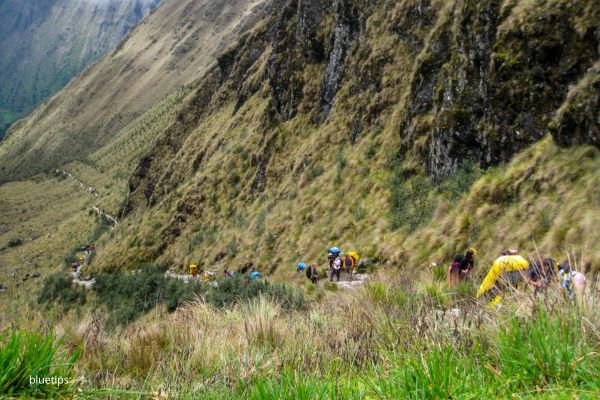Nestled in the picturesque landscapes of Greece, mountain trails have played a pivotal role in shaping the country’s rich history and culture.
From ancient paths steeped in mythological significance to modern challenges of environmental degradation and economic factors, these trails offer a window into the past and present of Greek society.
This article explores the importance of preserving these trails, the opportunities they offer for adventure and ecotourism, and provides tips for responsible exploration.
Join us on a journey through the timeless call of the mountains in Greece.
History of Mountain Trails in Greece

The history of mountain trails in Greece dates back to ancient times, intertwining with the rich tapestry of Greek mythology and society. These trails served as vital pathways that connected communities, facilitated trade, and provided access to the mystique of the mountain landscapes.
They were not merely functional routes but held deep cultural significance, often being linked to mythological tales of gods, heroes, and epic journeys. In Greek society, these trails were intrinsic to the structure of communities, shaping interactions and fostering a sense of unity among the people. As travelers traversed these ancient paths, they encountered sacred sites, shrines, and natural wonders, further enhancing the spiritual and historical aura surrounding the mountain trails.
Ancient Trails and Their Importance in Greek Mythology
The ancient trails of Greece are deeply rooted in mythology, with stories of gods and heroes navigating the rugged mountain paths, leaving behind a legacy of adventure and mystique that still echoes through the modern trails.
These trails served as more than just physical routes; they were also conduits connecting the mortal world with the realm of the divine. Mythical creatures lurked in the shadows, and ancient gods intervened in the lives of those who dared to follow these paths. The tales of bravery, betrayal, and triumph along these trails not only entertained the ancients but also instilled values of courage and perseverance. Today, hikers who traverse these same paths are not just exploring nature but also stepping into a rich tapestry of history and legend.
The Role of Mountain Trails in Ancient Greek Society
In ancient Greek society, mountain trails were essential conduits for communication, trade, and cultural exchange, shaping the interconnectedness of city-states and fostering a sense of exploration and connection to the land.
The mountain trails not only facilitated the transportation of goods and information between different regions but also played a crucial role in the exchange of ideas, beliefs, and practices among diverse communities. These pathways served as meeting points for travelers from various city-states, enabling the sharing of knowledge and traditions, ultimately leading to a rich tapestry of cultural interactions. Through these routes, ancient Greeks were able to forge alliances, resolve conflicts, and engage in diplomatic missions that laid the foundation for the interconnectedness of the ancient world.
Modern Challenges for Mountain Trails in Greece
Despite their historical significance, modern mountain trails in Greece face a myriad of challenges stemming from environmental degradation, overuse, and the complexities of balancing tourism development with conservation efforts.
Issues such as erosion, habitat destruction, and littering have become increasingly concerning as visitor numbers rise. The delicate ecosystems along these trails are at risk, highlighting the urgent need for sustainable practices and effective management strategies. Balancing the economic benefits of tourism with preserving natural landscapes has become a significant concern for authorities and conservationists.
Implementing responsible tourism practices, promoting education on environmental conservation, and enforcing regulations to protect these areas are crucial steps towards ensuring the longevity and viability of Greece’s mountain trails.
Environmental Degradation and Overuse
The fragile mountain ecosystems of Greece are under threat from environmental degradation and overuse, exacerbated by the influx of tourists and outdoor enthusiasts seeking to explore these pristine landscapes.
Unsustainable practices such as littering, trail erosion, and habitat destruction have put immense pressure on the delicate balance of these mountain trails. The sheer volume of visitors, often unaware of their impact, has led to a gradual degradation of vegetation, soil erosion, and disturbance to wildlife.
These challenges highlight the urgent need for conservation initiatives that focus on promoting ecotourism and sustainable practices to protect the natural beauty of Greek mountains for future generations to enjoy.
Political and Economic Factors Affecting Mountain Trails
Political and economic considerations play a pivotal role in shaping the fate of mountain trails in Greece, with conflicting priorities between tourism development, conservation efforts, and preserving the cultural heritage embedded in these landscapes.
These factors often lead to a delicate balancing act for authorities and stakeholders involved in managing these trails. The challenge lies in creating sustainable tourism strategies that generate economic benefits while ensuring the preservation of the natural environment and historical sites.
Conservation projects are crucial in maintaining the ecological integrity of these areas, preventing overdevelopment that could harm delicate ecosystems. Sustainable development initiatives aim to promote responsible tourism practices, seeking to minimize the negative impacts of increased visitor numbers on these sensitive landscapes.
The Importance of Preserving and Protecting Mountain Trails in Greece

Preserving and protecting the mountain trails of Greece is paramount for safeguarding the natural beauty, cultural heritage, and ecological balance of these pristine landscapes, ensuring their sustainability for future generations.
Conservation efforts play a crucial role in maintaining the delicate balance between human activity and nature in these mountainous regions. By implementing sustainable practices, such as responsible waste management, controlled visitor access, and habitat restoration programs, the unique flora and fauna can flourish undisturbed. Promoting ecotourism initiatives not only protects the environment but also generates economic opportunities for local communities, fostering a sense of ownership and pride in preserving their cultural heritage. Through collective environmental stewardship, these efforts pave the way for a harmonious coexistence between humans and the natural world.
Cultural and Historical Significance
The mountain trails of Greece hold immense cultural and historical significance, serving as conduits of ancient civilizations, repositories of traditional practices, and gateways to archaeological wonders that dot the landscape.
These trails not only offer breathtaking views of the majestic landscapes but also play a crucial role in preserving the rich cultural heritage of the region. Along these ancient paths, one can uncover hidden archaeological treasures that shed light on the past civilizations that once thrived in these mountains.
The trails themselves are steeped in history, with legends and stories passed down through generations. The preservation efforts put into maintaining these trails not only ensure their sustainability but also safeguard the historical sites and traditions that are integral to the cultural tapestry of Greece.
Ecotourism and Sustainable Development
Embracing ecotourism and sustainable development practices is essential for ensuring the long-term viability of mountain trails in Greece, fostering a harmonious relationship between tourism activities and environmental conservation.
By promoting responsible tourism practices along these scenic routes, visitors can actively contribute to the preservation of Greece’s rich natural heritage. Sustainable tourism not only benefits the environment but also plays a crucial role in supporting local communities by creating economic opportunities in rural areas.
By raising environmental awareness and implementing ecosystem protection measures, ecotourism initiatives can help safeguard the delicate balance of flora and fauna in these mountainous regions, ensuring that future generations can continue to enjoy these natural treasures.
How to Experience the Beauty and Adventure of Greek Mountain Trails
Embarking on Greek mountain trails offers a transformative experience, immersing adventurers in the awe-inspiring beauty of nature, captivating scenery, and exhilarating outdoor activities that showcase the splendor of the mountainous terrain.
Whether you are a seasoned hiker seeking challenging ascents or a nature lover looking to connect with the diverse ecosystems of the mountains, Greece’s hiking routes cater to a wide range of interests and abilities. From the rugged trails of Mount Olympus, home to ancient mythology and breathtaking views, to the verdant paths of Pindus National Park, where you can encounter unique flora and fauna, each route presents a tapestry of landscapes waiting to be explored.
Adventure opportunities abound, from rock climbing in the limestone cliffs of Meteora to peaceful meanders through pine forests and alpine meadows. The varied topography of Greek mountain trails ensures that every step unveils a new perspective and a fresh appreciation for the natural wonders that abound in these rugged landscapes.
Hiking and Trekking Routes
Traversing the hiking and trekking routes of Greece unveils a tapestry of natural wonders, from verdant valleys and cascading waterfalls to rugged peaks and panoramic vistas that promise unforgettable outdoor adventures.
The diverse landscapes in Greece cater to various adventure tourism enthusiasts, offering a plethora of options for all levels of hikers. You can explore the rugged terrain of the Aegean Islands or trek through the lush forests of the Pindus mountain range.
Each trail presents its unique charm, whether it’s the coastal paths overlooking the turquoise waters of the Mediterranean or the ancient footpaths that lead to hidden archaeological sites. The scenic beauty along these routes is just as captivating as the challenging terrain, making every step a journey through history and nature’s sublime creations.
Mountain Biking Trails
Mountain biking enthusiasts can savor adrenaline-pumping rides along the rugged mountain biking trails of Greece, immersing themselves in the thrill of outdoor adventure amidst stunning natural scenery and challenging terrain.
As riders traverse through the diverse landscapes of Greece, they can experience the heart-pounding excitement of conquering steep ascents, navigating winding paths, and speeding down exhilarating descents. The varied trails cater to both experienced bikers seeking a challenge and beginners looking to improve their skills in a picturesque setting.
Adventure seekers will be captivated by the combination of rugged beauty with the sheer rush of adrenaline that comes with mountain biking in Greece. Exploring these trails offers a perfect blend of adventure tourism, outdoor recreation, and breathtaking vistas that make every ride an unforgettable experience.
Climbing and Mountaineering Opportunities
For avid climbers and mountaineers, Greece offers a playground of challenging summits and iconic peaks, with Mount Olympus standing as a beacon of adventure and the ultimate test of mountaineering prowess.
The rugged terrain of Greece presents an exhilarating mix of diversity, from the limestone cliffs of Meteora to the towering rock faces of Mount Parnassus.
Climbers can revel in the varied landscapes, from seaside cliffs offering stunning coastal vistas to remote mountain ranges shrouded in mystery.
Explorers seeking a true adrenaline rush can tackle the vertical walls of Mount Athos, known for its sheer granite faces that provide a heart-pounding challenge for even the most seasoned climbers.
Tips for Responsible and Safe Mountain Trail Exploration in Greece

Exploring the mountain trails of Greece demands a blend of adventure and responsibility, with a focus on safety, trail conservation, and respecting the natural environment to ensure a sustainable and enriching outdoor experience.
When embarking on these journeys, hikers should equip themselves with sturdy footwear, ample water, navigation tools, and first aid supplies. It is essential to inform someone of your planned route and expected return time. Keeping a copy of the trail map and understanding trail markers can prevent getting lost. Avoid disturbing wildlife and plants by staying on designated paths, refraining from littering, and carrying out any waste.
Participating in volunteer trail maintenance programs and supporting local conservation initiatives can contribute to preserving these natural habitats for future generations to enjoy.
Frequently Asked Questions
What are some popular ancient trails in Greece that are still used today?
Some of the most popular ancient trails in Greece that are still used today include the Samaria Gorge Trail, the Menalon Trail, and the Vikos Gorge Trail.
What makes hiking in the mountains of Greece a unique experience?
Hiking in the mountains of Greece offers a unique experience due to the combination of ancient ruins, stunning landscapes, and rich history that can be found along the trails.
How have modern challenges affected the ancient trails in Greece?
Modern challenges such as erosion, over-tourism, and commercial development have had a negative impact on the ancient trails in Greece, leading to the need for conservation efforts.
Are there any guided tours available for hiking the ancient trails in Greece?
Yes, there are several guided tours available for hiking the ancient trails in Greece, which provide an informative and safe way to explore these historical paths.
What should I pack for a hiking trip on the ancient trails of Greece?
Some essential items to pack for a hiking trip on the ancient trails of Greece include sturdy hiking boots, a map or guidebook, plenty of water, and sunscreen.
Are there any specific rules or regulations for hiking on the ancient trails in Greece?
Yes, there are rules and regulations in place to protect the ancient trails in Greece, such as staying on designated paths, not removing or damaging any historical artifacts, and respecting the natural environment.




